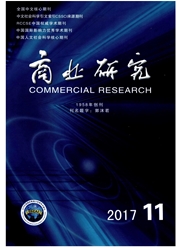

 中文摘要:
中文摘要:
基于制造商与零售商行为的斯坦伯格博弈,本文分析在碳税规制下零售商减排成本分担如何影响制造商与零售商减排的最优决策。研究结果表明:在零售商不承担减排成本时,零售商的最优订货批量与制造商的减排量正相关,零售商的最优订货量与产品的批发价格负相关;在零售商承担减排成本时,零售商的订购批量与制造商产品的减排量之间的关系主要取决于消费者对碳排放敏感度与零售商成本分担率之差,当消费者对碳排放的敏感度大于零售商成本分担率,零售商的最优订购量与制造商的减排量之间正相关,反之则负相关。零售商的订购批量与制造商确定的半成品价格负相关;实施成本分担契约后,如果制造商的减排量满足一定约束条件,制造商的利润和零售商的利润会同时增加,实现帕累托最优。
 英文摘要:
英文摘要:
Based on Stackelberg game between manufacturer and retailer, this paper analyzes how retailer cost sharing on emission reduction affects optimal decisions of manufacturer and retailer emission reduction. The results show that optimum order batch of retailer is positively correlated with volume of carbon emission reductions of manufacturer, and is negatively correlated with wholesale price of product without retailer cost sharing; with retailer cost sharing, the relationship between optimum order batch of retailer and volume of carbon emission reductions of manufacturer depends on the difference between carbon emission sensitivity and retailer cost sharing rate: if carbon emission sensitivity is greater than retailer cost sharing rate, optimum order batch of retailer is positively correlated with volume of carbon emission reductions of manufacturer, otherwise they are negatively correlated. Optimum order batch of retailer is negatively correlated with the price of semi-manufactured goods.
 同期刊论文项目
同期刊论文项目
 同项目期刊论文
同项目期刊论文
 期刊信息
期刊信息
